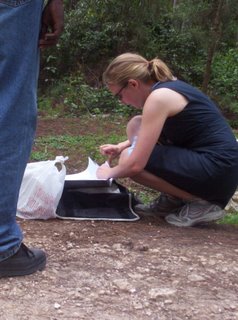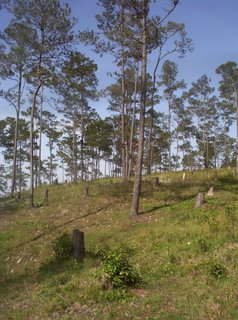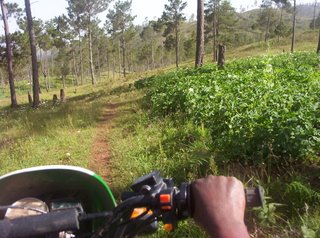Wednesday, July 5 to Friday, July 7




These past three days were quite adventurous. Cher-Frere (him name literally means "Dear Brother") picked me up early Wednesday morning on his motorcycle and we drove, after several stops, to Fond Verrettes and then, finding no food there, on to the Foret des Pins. From there we took the road to Gros Cheval--a road that neither of us had ever traveled before. It was extremely muddy--at one point we ended up knee-deep in mud, though luckily the motorcycle has no problems getting wet and all my "instruments" and papers and maps stayed dry--but passed through a large tract of the pine forest, which was lovely. It was market day in Gros Cheval, and we found some rice and beans to eat and then gathered a few data points in the Magoman area.
Cher-Frere found a peasant farmer he knows from the cooperative he works with in Fond Verrettes, so we spent the night (it was very cold!) with his family. Neither of us got much sleep. We had some strong coffee and potatoes--the most delicious boiled potatoes, straight out of the field and oh-so-flaky--for breakfast and set off for the Savanne Pistache area. We soon found out the road is impassable even for 4-wheel drive vehicles and many roads on my map no longer exist. The area we were riding through--just south of my study area watershed--was so pretty. It was like we were out for a picnic: the air was warm, the sky sunny and blue, pine trees everywhere, and flat clearings of daisies and ferns, everything smelling so wonderful. Soon the road became worse and we were stopping frequently to clear trees out of the path, or I would walk behind the motorcycle as Cher-Frere took it over logs or along dangerous ridges. At one point a tree was too big for us to move and we had to put the motorcycle on its side and push it under--not an easy task. We started to come across areas where at least half the pines had recently been cut and huge piles of pine wood being turned into charcoal by a slow smoldering process. Everywhere there were signs of recent deforestation, fresh sawdust, even the sound of lumber being sawed or trees felled. Finally the road became impossible to get through by motorcycle and we walked the rest of the way to Savane Pistache.
There, we found a mountain slope completely denuded of pine trees and covered with stumps. Everyone was afraid of us. As we walked up the mountain we noticed men and boys popping up from everyone around us, guardingly watching us and our progress and forming a semi-circle around us. As Cher-Frere said, they had no reason to be on that mountain except to cut wood. Many of them had axes. Cher-Frere stopped to talk and answer questions while I went on my own and scouted out a few of my research points. I could see Mt. Gentilhomme in the distance, but we didn't have time to got there.
When I returned, I found Cher-Frere standing in front of a group of about 25 people giving a "workshop" on the problems of cutting all the pines and listening to the complaints that there was no other way to make a living. They didn't want to let him go but he promised to return another time to hold a round-table discussion on the issue. :) I think it was great for Cher-Frere to get to this remote area and see what is happening here--he will tell SKDE about it and they will start working on the problem. [Note: Cher-Frere loves motorcycles and says that any development organization in Haiti worth its weight has a motorcycle. It's true that many areas in Haiti are inaccessible even by heavy-duty trucks.]
Further down the moutain we came on the ruins of a former water reservoir--from the time of the 1914 US invasion or earlier from colonial times??? People here were frightened by us, thinking we'd come to arrest them for the illegal tree harvesting. Groups of grown men ran away from me--a strange experience.
The road was rough on the motorcycle and it periodically needed some small repairs, which Cher-Frere capably did. However, when we pushed the motorcycle on it's side under the tree as we returned to Gros Cheval, it was not happy. Seemingly, we'd bought bad gas in Gros Cheval and some water had gotten into the carburetor. After an hour of trying to repair it, we started pushing the motorcycle to Gros Cheval--about 5 km away. It was tough work. Finally, after about an hour of this heavy work, Cher-Frere managed to coax the motorcycle back into shape and we were off again, though we'd lost precious time I wanted to spend collecting points. We turned around and I went back and collected some of the data we'd missed.
We'd had nothing to eat all day but the potatoes early that morning. We road back through Gros Cheval, back through the mud on the road to the Foret des Pins, and back down the mountain to Fond Verrettes, where, around 8:30 in the evening, we finally found some rice and peas and water (I was entirely dehydrated). We slept at the cooperative, which was wonderful except for a large tarantula.
Friday morning Cher-Frere did some work with the cooperatives (two weeks ago the main leader in the area, Adrien, was murdered in his home near Port-au-Prince and Cher-Frere was doing some investigating into the causes; the population in the area is stunned and reeling from his death) and I gathered some data and even got to talk on the local radio station about my research. Then, it was time to head back to Port-au-Prince. I didn't stay the weekend in Fond Verrettes--I was too tired, dirty, bruised and exhausted, plus my cell phone didn't get reception so I hadn't talked with Ben for several days. It was wonderful to be back at Pierre's, take a shower (I hadn't so much as washed my face the entire trip), talk to Ben, eat real meals, use the internet and rest!

0 Comments:
Post a Comment
<< Home